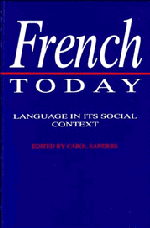Book contents
- Frontmatter
- Contents
- List of figures and maps
- List of tables
- Notes on the contributors
- Acknowledgements
- Introduction
- 1 French: a planned language?
- 2 Sociosituational variation
- 3 Regional variation in France
- 4 The other languages of France: towards a multilingual policy
- 5 The migrant languages of Paris
- 6 Gender and language in French
- 7 The reform of the writing system
- 8 Alternative French
- 9 New words for new technologies
- 10 Language and style in politics
- 11 French and French-based Creoles: the case of the French Caribbean
- 12 French in Africa
- 13 French in Canada
- 14 Sociolinguistic variation and the linguist
- Bibliography
- Index
12 - French in Africa
Published online by Cambridge University Press: 05 June 2012
- Frontmatter
- Contents
- List of figures and maps
- List of tables
- Notes on the contributors
- Acknowledgements
- Introduction
- 1 French: a planned language?
- 2 Sociosituational variation
- 3 Regional variation in France
- 4 The other languages of France: towards a multilingual policy
- 5 The migrant languages of Paris
- 6 Gender and language in French
- 7 The reform of the writing system
- 8 Alternative French
- 9 New words for new technologies
- 10 Language and style in politics
- 11 French and French-based Creoles: the case of the French Caribbean
- 12 French in Africa
- 13 French in Canada
- 14 Sociolinguistic variation and the linguist
- Bibliography
- Index
Summary
Introduction
It seems to be increasingly accepted that the survival of French as an international language depends on its development in Africa. Is this indeed so? Can one say that in the year 2000 most French speakers will be African? And is such a geographical and demographical extension taking place without causing radical changes to the French language, now that it is being adapted to a new African context and used by Africans, whose conceptual universe is not the same as that of the French?
I shall endeavour to give a concise answer to these questions by describing the current state of the French language in Africa. In a few pages it is not possible to deal fully with all aspects of the language, so I shall only deal with the analysis of the lexicon to illustrate my remarks.
An optimistic vision
This vision of an African destiny for the French language has been outlined in many recent documents produced for summit meetings of heads of state and government that have in common the use of French (Paris: 1986; Quebec: 1987; Dakar: 1989). The vision is based on three factors.
- Type
- Chapter
- Information
- French TodayLanguage in its Social Context, pp. 215 - 239Publisher: Cambridge University PressPrint publication year: 1993
- 2
- Cited by



